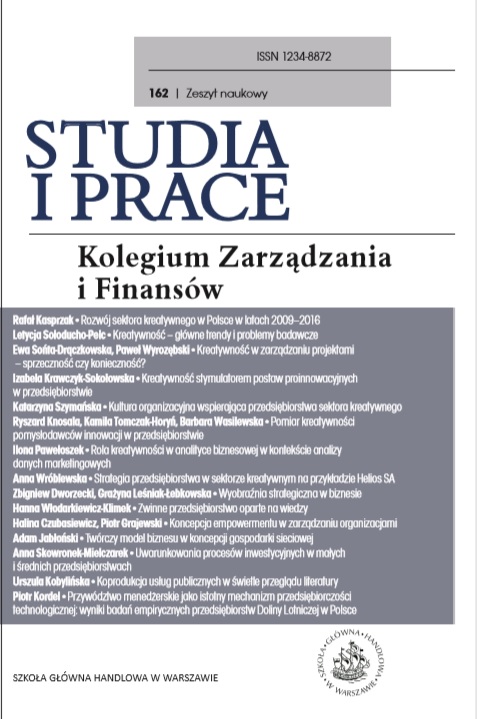Knowledge-Based Agile Companies
DOI:
https://doi.org/10.33119/SIP.2018.162.10Keywords:
agile company, knowledge-based companies, opportunitiesAbstract
The dynamics and unpredictability of the modern environment require prompt responses to shortlived opportunities and making the most of them. It is possible thanks to the concept of agile company which, due to the specific character of external resources as well as the methods of operation, can identify opportunities immediately and make use of them for its own growth and development. The publication is aimed the presentation of evolution of the concept of knowledge-based organisations towards the creation an agile organisation. The study indicates the conditions for the development of agility of modern companies and presents the model of a knowledge-based agile company. The publication has a character of theoretical considerations leading to the structuring of the concepts of corporate agility and its model description.
Downloads
References
2. Browne J., Zhang J., Extended and Virtual Enterprises – Similarities and Differences, „International Journal of Agile Management Systems” 1999, no. 1, s. 30–36.
3. Byrne J. A., The Virtual Corporation, „Business Week” 1993.
4. Czakon W., Sieci w zarządzaniu strategicznym, Oficyna a Wolters Kluwer business, Warszawa 2012.
5. Dowlatshahi S., Cao Q., The Relationships Among Virtual Enterprise, Information Technology, and Business Performance in Agile Manufacturing: An Industry Perspective, „European Journal of Operational Research” 2006, no. 174, s. 835–860.
6. Dyduch W., Bratnicki M., Charakterystyki organizacji inteligentnej, „Studia i Prace Kolegium Zarządzania i Finansów” 2016, nr 149, Oficyna Wydawnicza SGH, Warszawa, s. 9–24.
7. Kałkowska J., Pawłowski E., Włodarkiewicz-Klimek H., Zarządzanie organizacjami w gospodarce opartej na wiedzy, Wydawnictwo Politechniki Poznańskiej, Poznań 2013.
8. Mikuła B., Organizacje oparte na wiedzy, Wydawnictwo Akademii Ekonomicznej w Krakowie, Kraków 2006.
9. Mikuła B., Pietruszka-Ortyl A., Potocki A., Zarządzanie przedsiębiorstwem XXI wieku, Wybrane koncepcje i metody, Difin, Warszawa 2002.
10. Morawski M., Przedsiębiorstwo zorientowane na wiedzę, „e-mentor” 2006, nr 4 (16).
11. Niewiadomski P., Determinanty elastyczności funkcjonowania przedsiębiorstwa produkcyjnego sektora maszyn rolniczych, Wydawnictwo Politechniki Poznańskiej, Poznań 2016.
12. Senge P. M., Piąta dyscyplina. Teoria i praktyka organizacji uczących się, Oficyna Wolters Kluwer business, Warszawa 1998.
13. Sherehiy B., Karwowski W., Layer J. K., A Review of Enterprise Agility: Concepts, Frameworks, and Attributes, „International Journal of Industrial Ergonomics” 2007, no. 37, s. 445–460.
14. Stańczyk-Hugiet E., Organizacja ucząca się, w: Zarządzanie przedsiębiorstwem w turbulentnym otoczeniu, red. R. Krupski, Polskie Wydawnictwo Ekonomiczne, Warszawa 2005.
15. Trzcieliński S., Zwinne przedsiębiorstwo, Wydawnictwo Politechniki Poznańskiej, Poznań 2011.
16. Włodarkiewicz-Klimek H., Human Capital in the Development of Mechanisms Improving the Agility of Organizations, w: Advances in Ergonomics of Manufacturing: Managing the Enterprise of the Future, red. S. Trzcielinski, Proceedings of the AHFE 2017 International Conference on Human Aspects of Advanced Manufacturing, Los Angeles, California 2017, s. 88–105.
17. Włodarkiewicz-Klimek H., Koncepcja i modele zwinnego przedsiębiorstwa, „Zeszyty Naukowe Politechniki Poznańskiej” seria Organizacja i Zarządzanie, nr 71, Poznań 2016, s. 213–225.
18. Yusuf Y. Y., Sarhadi M., Gunasekaran A., Agile Manufacturing: The Drivers, Concepts and Attributes, „International Journal of Production Economics” 1999, no. 62 (1–2), s. 33–43.









